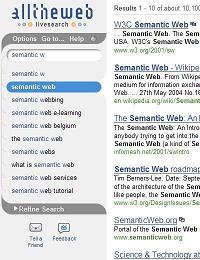Despite the warm debate about this, I'm not much interested on whether the
Web 2.0 exists or not, if it is just a buzzword or a serious movement. What really matters to me is to catch the few aspects that make the difference as opposite to the
old way of conceiving and building the Web. So, in a few words, here's what Web 2.0 means to me:
The Blogosphere and the Wikisphere have developed around the concept of Collaboration. RSS Feeds and the so-called Mashosphere turn around the Syndication concepts. The Semantic "layer" develops on tagging (more than
RDF) to annotate data. Finally, search engines (especially the next generation, based on semantic queries) glue all together.
I'm not sure the picture is complete enough to cover all of the aspects of the Web 2.0, but I think it's a starting point to think to a
metamodel of the Web 2.0.
More to come...
Technorati tags: metamodel, rdf, metadata, tagging, syndication, collaboration, search engine, web2.0.

